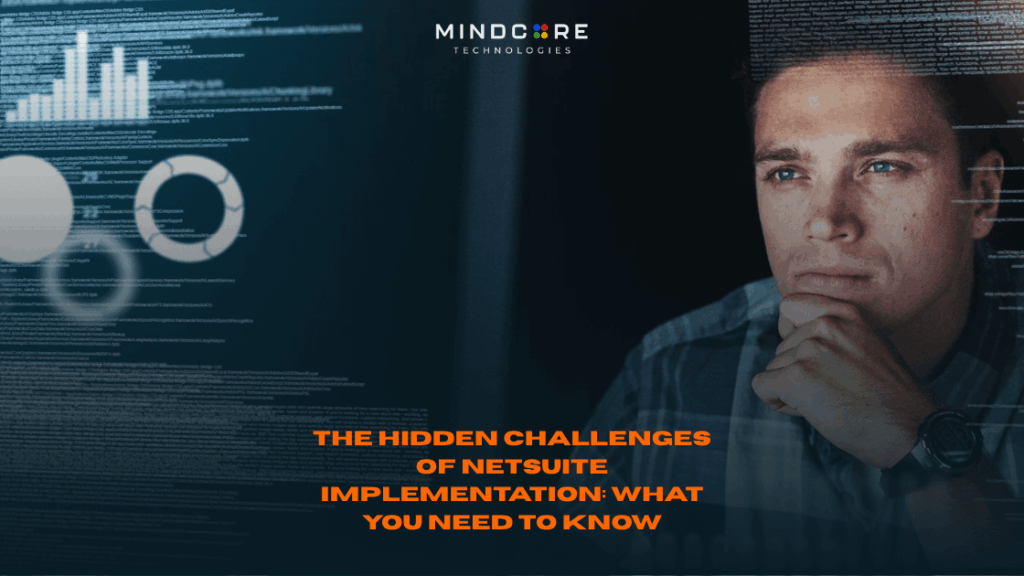Introduction
NetSuite, the effective ERP system has revolutionized the processing mechanism of enterprises that deal with different operations, sorting them out in a better manner. However, it has a great importance during implementation, often middle management frustrates it. The migration can be challenging when moving away from legacy systems or even QuickBooks. The issues that come up are due to user opposition, implementation difficulties, and other stuck-in-their-ways outdated practices such as the infamous ‘magic spreadsheet.’ These are some of the challenges that can have serious impacts on the undertaking of your ERP project if not handled in the best manner.
This blog will highlight the hidden challenges about NetSuite implementation and provide solutions for the same. Regardless of whether your organization is in healthcare, manufacturing or professional services, you need to read this post to get the best of all offered by NetSuite and at the same time avoid some significant errors.
1. Resistance to Change: The Biggest Barrier
Lack of willingness to adapt can be considered one of the most overlooked challenges in implementing NetSuite, especially your employees that probably became very experienced in such systems as far as they are, may not like this idea. Companies might guard their current procedures due to fear of public shame in case things turn sour, or they might be wary of handing over control of activities in which they are accustomed.
An important maneuver to defeat resistance is analyzing change champions, individuals; in the facility who embrace the change process and using them to encourage the other members of the organization. On the other hand is finding those individuals such as the administrative staff with negative attitudes towards change and helping them let go of their resistances.
How to Manage Resistance:
- Engage Early: Begin the process of involving employees in decision making long before they are asked to participate in implementation. One has to explain how they stand to gain individually from the new system as well as how it will ease their work.
- Provide Training: Investing in ways to fully train the employees will help in cutting down resistances because the employees will feel more comfortable using the new system.
- Be Transparent: You should address their fears immediately, let them in on what could go wrong and how you and your team are going to handle it.
2. The Magic Spreadsheet Problem
Most businesses have a “magic spreadsheet” with 50 tabs that contains all critical data and processes. Employees rely on it because it works—even if it’s a convoluted, manual process. Moving from such an entrenched system to NetSuite can be quite uncomfortable for employees that are so emotionally tied to their excel spreadsheets.
NetSuite users are able to perform replications of the magic of their spreadsheets through the application’s analytics module which schedules and delivers reports to user’s inbox daily. While many other ERP software make it extremely difficult for employees to transition from manual or legacy systems to enabling processes that NetSuite offers, NetSuite does not force the users to completely change their workflow, but rather incorporates the change into their work pattern.
How to Manage the Magic Spreadsheet Transition:
- Show Benefits of Automation: Show how with NetSuite, those crucial reports can be recreated by the program thereby eliminating the need to spend countless hours doing it manually.
- Replicate Familiar Processes: As much as possible, employees should work within NetSuite to create similar processes to those they have already been using but are less efficient, then slowly accustom them to better methods.
- Offer Continued Support: Let employees understand that the transition to NetSuite is not temporary hence they are free to let go of their methods.
3. Adoption Issues: Why Projects Fail
A common reason why ERP projects, including NetSuite, fail is poor adoption. Getting the system out in the first place may be easy or even achieve the expected outcome during the initial times but what would be harder is using employees to maintain its use. Unfortunately, often after implementation, people will carry on doing things in their usual way, with the belief that the new process is too complicated and time consuming to learn.
It has become apparently clear that adoption failure stems from the fact that employees are often not sufficiently involved during implementation. Perhaps they were trained on the system, but if the training is not followed by usage, then adoption will always be hard.
How to Improve Adoption:
- Custom Training: It’s better to organize separate workshops to make specific emphasis on the responsibilities that directly refer to the employees.
- Hands-On Learning: Let the employees practice on the system and run some mock sessions.
- Ongoing Support: Adoption is not a final step and implementation should not be mistaken for it. They suggest offering training and support for some several months after the launch of the system.
4. Automating Manual Tasks: A Key to Success
One of Oracle NetSuit’s biggest strengths, one that truly highlights its ERP nature, is the possibility to eliminate an overwhelming number of hours spent on mundane tasks, for instance, bank reconciliation. In cases where the processes have become obsolete, automation of these tasks can save much needed time necessary for other strategic actions.
Some of the relief that businesses get from NetSuite is the fact that there are no longer tiresome tasks such as handling spreadsheets, bank statements and invoices. Besides increasing operational efficiency, automation also helps eliminate human mistakes within different businesses’ processes.
Benefits of Automation in NetSuite:
- Time Savings: Scheduling and repetitive work can be automated in most companies and save hundreds of hours per year for higher value-added work.
- Reduction in Errors: Automated processes reduce possibilities of data errors, such as data entry and financial reconciliation, hence resulting in spotless data.
- Increased Productivity: Thus, a greater portion of the team’s time can be spent on more valuable activities that would benefit the company out of performing repetitive physical work.
5. Scalability and business growth are two areas where NetSuite has proved very effective.
Another advantage of NetSuite that will be very appealing to any company that aims to expand is the feature of expansibility. From ‘heroic’ modes of operation to Lean and efficient, NetSuite offers the necessary weapons for fighting complexity without bringing in scale and overhead.
By implementing a NetSuite, companies are no longer operating the way that comes in reactive towards change; instead, companies will be able to evaluate and anticipate change based on data. Whether it is in the area of accounts payable and receivable, product ordering or inventory, delivery and fulfillment, NetSuite provides the tools businesses need to gain better insight into their operations and dynamics for sustainable growth.
How NetSuite Enables Growth:

- Scalable Solutions: Through functionality and customization, NetSuite offers large businesses, multi-location businesses, flexibility for growth.
- Data-Driven Decisions: Through real-time data processing and automated analysis, managers are able to make effective decisions without undue delay and with great precision.
- Improved Efficiency: As businesses grow the system reduces workload since it fast-forward the time spent on such activities enabling focus and development to be advanced.
Conclusion
Therefore I must stress that NetSuite has its share of implementation issues but they are by no means catastrophic. The journey from basic to advanced Microsoft Office use has its hurdles, but your business can take some actions to make the crests and troughs less conspicuous. With a robust system like NetSuite at your fingertips and your team possessing a complete understanding of what’s at stake here, there is nothing that can go wrong and your business can be highly efficient.
If your organization is currently struggling with the NetSuite project or if you are still deciding to switch to it, now is the moment for change. What you may not know is that there may be issues that are out of sight but could grossly affect the outcome of your work – contact an expert and begin benefitting from the use of NetSuite.
Time to change the world of your business? Call us now for your no obligation consultation and find out how NetSuite can benefit your company’s operations and expansion.


